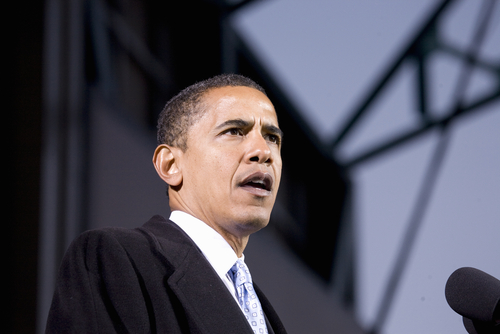
TOKYO – Opening a four-country swing through the Asia-Pacific region, President Barack Obama is aiming to promote the U.S. as a committed economic, military and political partner, but the West’s dispute with Russia over Ukraine threatens to cast a shadow over the president’s sales mission.
Obama arrived in Tokyo late Wednesday for an official state visit after flying overnight from the U.S. He headed straight for a private dinner with Japanese Prime Minister Shinzo Abe, setting the stage for bilateral talks Thursday. Obama will also be the guest of honour at a state dinner Thursday night at the Imperial Palace, the moat-lined and stone-walled home of Emperor Akihito and Empress Michiko. He is travelling without first lady Michelle Obama.
The eight-day trip is a do-over of the Asia tour Obama had scheduled last October but cancelled in the midst of the partial shutdown of the U.S. government.
As with last fall’s trip, the White House wants to keep the focus on Obama’s promised “rebalance” of U.S. policy toward Asia, after years of attention on the Middle East and the fight against terrorism. One goal of Obama’s stops in Japan, South Korea, Malaysia and the Philippines is to demonstrate the benefits to America of deeper economic relations with the fast-growing region.
But the continued need for Obama to devote time and energy to more pressing matters at home and abroad has fostered lingering doubts here about the depth of the U.S. commitment. And the situation in Ukraine threatens to divert at least some of Obama’s attention this week.
Relations between neighbours Russia and Ukraine remain tense nearly a week after both countries, the U.S. and the European Union inked an agreement in Geneva calling on Moscow to use its influence over pro-Russian forces to have them lay down their arms and end their occupation of government buildings in eastern Ukraine.
Each side accuses the other of failing to uphold its end of the deal.
The White House, which lays the blame squarely on Russia and praises Ukraine for behaving responsibly, has said it is monitoring the situation closely and is prepared, without being specific about a timeline, to slap additional sanctions on Russia “in the coming days” if it fails to abide by the terms of the tenuous deal.
“We are calling on all parties to comply with the commitments they’ve made,” White House press secretary Jay Carney told reporters travelling with Obama.
The U.S. response in Ukraine has unsettled some Asian countries, leaving them to wonder how reliable a partner the U.S. would be if they ever faced a similar situation given their own sea and air disputes with China. They are seeking reassurance from Obama.
In Japan, Obama and Abe are expected to discuss trade and security concerns, including China and North Korea, among other issues. Ukraine may be on the agenda, too; Japan backs existing Western sanctions against Russia for taking the Crimean Peninsula away from Ukraine. Japan also has provided financial support to Ukraine’s interim government.
The U.S. and its close regional ally Japan are the largest economies among 12 countries negotiating the Trans-Pacific Partnership, a free-trade deal with several Asian countries that could have served as a centerpiece for Obama’s visit. The U.S. had wanted to wrap up the deal by the end of last year, but the talks have stalled, with the U.S. and Japan remaining “at a considerable distance” over trade in farm products and vehicles, Japan’s economy minister Akira Amari told reporters Tuesday.
No significant breakthroughs or announcements were expected this week. U.S. officials have said the talks will continue well after Obama leaves.
“The betting is against it,” said Michael Green, senior vice-president for Asia and Japan chair at the Center for Strategic and International Studies, a Washington think-tank .
A U.S.-Japan agreement is seen as crucial for progress on the broader deal that would set 21st century trade rules for the dozen nations. Whenever the TPP talks conclude, Obama would face the additional burden of getting the deal through Congress, where fellow Democrats in both chambers oppose legislation that would smooth its passage.
On the way to Japan, Obama stopped for several hours in Washington state to survey damage from a massive mudslide last month that killed at least 41 people and destroyed dozens of homes. He consoled loved ones of the victims and lauded the emergency workers who continue the painstaking search for two people still listed as missing.
Obama is due back in Washington on Tuesday.
___
Associated Press writer Mari Yamaguchi contributed to this report.